Resources & Sustainability
In an interdisciplinary approach, this focus emphasizes sustainability sciences as well as resource utilization and management, such as water and energy. It addresses supply security, resilience, and circular value creation for a sustainable future.
Ongoing research projects on Resources & Sustainability
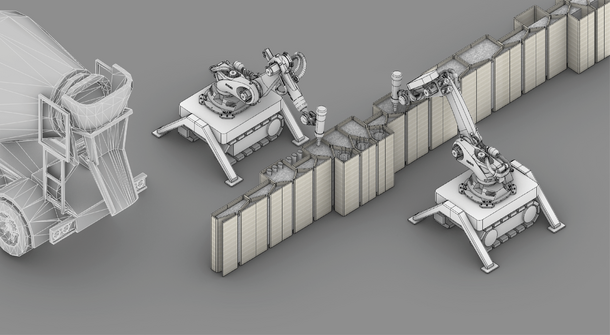
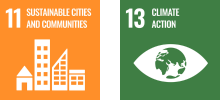
Project Leadership: Prof. Sven Pfeiffer
Funding Provider: Federal Ministry for Economic Affairs and Climate Action (BMWK)
Duration: 2022 – 2025
The objective of the 3DLight_OnSite project is to reduce CO2 emissions in the construction industry by developing a consistently CO2-optimized digital workflow for manufacturing multifunctional lightweight components with graded properties. The main innovation lies in introducing lightweight construction in the building sector through the conceptualization, development, and testing of in-situ manufacturing in additive manufacturing. Materials and digital planning methods are being developed for personalized, multifunctional lightweight components manufactured using robot-assisted additive processes. The project bridges the gap between fundamental research and industrial application by testing and validating the results with reference components from practical applications.
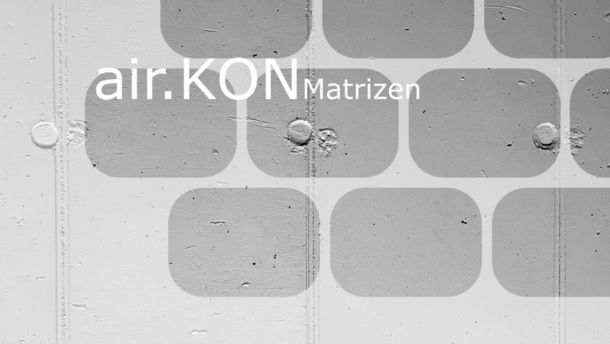
Project leader: Prof. Dr.-Ing. Andrej Albert & Thilo Schmidt, M.Sc.
Funding provider: Federal Ministry for Economic Affairs and Climate Action (BMWK)
Duration: 2022 – 2025
Co-op partners: fischerwerke GmbH & Co. KG, Ruhr-Universität Bochum and RWTH Aachen
The objective of the "air-Kon-Matrices" initiative is to develop inflatable, individually shaped, resource-efficient hollow chamber matrices for the production of lightweight foundations. These matrices are intended to be incorporated into the formwork of foundations to selectively displace excess concrete, thereby significantly reducing energy consumption and associated CO2 emissions.
The responsibility for optimizing the form of the hollow chamber matrices lies with the Department of Solid Construction at Hochschule Bochum. This entails computational proof of load-bearing capacity through nonlinear FEM simulations and the application of an algorithm based on genetic programming.
A schematic depiction of an 'air-Kon foundation plate' under typical load conditions with tailor-made hollow chamber matrices is illustrated in the accompanying figure.
Project management: Prof. Dr.-Ing. Inka Mueller
Funding organisation: German Research Foundation (DFG)
Duration: 2020 – 2022 (prolonged until March 2024)
The project focuses on Structural Health Monitoring (SHM), which involves continuous or periodic automated methods for assessing and monitoring the condition of monitored objects. The lack of comprehensive methods for evaluating SHM systems, in particular those based on guided waves, will be addressed by this scientific network. While traditional ultrasound methods have established quality assessment procedures, wave-based SHM systems present unique challenges, such as fixed sensor positions leading to location-dependent results for damage detection. The network aims to collaboratively address these challenges, share solutions, publish results and provide a basis for potential research projects. The aim is to develop a common understanding of issues related to holistic quality assessment of wave-based SHM systems.
Project Leadership: Prof. Volker Huckemann
Funding Source: Federal Ministry for Economic Affairs and Energy (BMWi)
Duration: 2020 – 2023
Georg-August-University in Göttingen is transforming a 19th-century university building, listed for historical preservation, into the "Forum Wissen," a combined teaching, research center, and museum. Since January 2020, the building is being comprehensively renovated to suit its new function while preserving its historical appearance.
A key aspect of the renovation is meeting the museum's specific conservation requirements for room climate. To protect against solar radiation without altering the building's external appearance, Merck's switchable glazing is being installed. This technology ensures natural color rendition inside and contributes to a suitable climate for both exhibits and visitors, maintaining the building's original look.
The project includes researching the pilot use of switchable glazing in a museum setting. This involves achieving climatic requirements and assessing energy differences compared to traditional shading solutions.
The project's success is measured through thermal simulation, using TRNSYS software to model a museum section and simulate the switchable glazing. After validating the model with extensive climate and building technical parameters, it will serve as the basis for investigating the glazing's pilot use and optimizing the museum's technical operations.
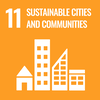
Project Leadership: Prof. Dr.-Ing. Dirk Eling
Funding Provider: European Regional Development Fund (ERDF)
Duration: 07/2020 – 03/2023
Co-op partners: District Administration of Recklinghausen and the University of Duisburg-Essen's Institute for Construction Operation and Management
The construction industry, amidst challenges like housing shortages and sustainability demands, is leveraging technological advancements and digitalization for innovation. In the Ruhr metropolitan area, the pressure for innovation is heightened due to urban transformation and the need for sustainable solutions.
The project focuses on the implementation of Building Information Modeling (BIM). BIM provides a significant opportunity for more efficient and sustainable renovations, especially in the face of a renovation backlog in the region.
Key aspects of the project include creating detailed BIM models from diverse existing data and integrating quality and origin metadata. These efforts aim to enhance the local construction industry's competitiveness and efficiency, facilitating knowledge transfer from academia to practice and contributing to sustainable urban development. BIM's implementation will not only improve resource efficiency but also bolster economic and social sustainability by enabling cost-effective public construction projects, potentially aiding socially disadvantaged groups.

Project management: Prof. Dr.-Ing. Inka Mueller
Funding source: Bundesministerium für Wirtschaft und Klimaschutz
Duration: 2022-2024
A current problem in acoustic emission testing is the comparability of acoustic emission sensors from different manufacturers and the verification of the functionality of the sensor technology in laboratory and field use.
Two areas are to be addressed as part of the project. In the area of sensor calibration, comparisons of the various favored methods are to be carried out. For this purpose, studies on calibration using a laser vibrometer as a reference measuring system and studies using directly coupled sensors are to be carried out. Based on these investigations, a specification/standard is to be prepared that shows how acoustic emission sensors can be calibrated and characterized in a practicable and comparable manner.
In the area of sensor verification, the focus is on identifying a practicable procedure for simple use in the laboratory and in the field. The focus is on determining the main variables influencing the test result and designing a process protocol for testing functionality in a wave-based approach or in an approach using electromechanical impedance. This should also serve as a basis for the development of a specification/standard. The work packages of BO focus on sensor verification using the electromechanical impedance.
The project is intended to support the market penetration of acoustic emission testing through the development of uniform interfaces, data sheets, specifications and standards. At the same time, it is intended to show ways in which the precarious situation of sensor calibration can be overcome at an international level.

Project management: Prof. Dr. Erik H. Sänger
Funding body: Deutsche Forschungsgemeinschaft (DFG)
Grant period: 2019 – x
Project overview: Reinforced concrete structures are an integral part of modern life, but ensuring their longevity is crucial. This DFG-funded project, led by Professor Dr Christoph Gehlen, focuses on the development of a novel method using Codawave Interferometry (CWI) to assess the safety and durability of these structures. By studying the diffusive nature of coda waves in concrete, the project aims to detect changes in the structure, environmental parameters and loading conditions. Through laboratory experiments, numerical modelling and practical applications, the aim is to create a valuable management tool for reinforced concrete structures.
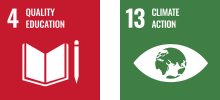
Project management: Prof. Dr. Carla J. Vogt
Funding source: Deutsche Forschungsgemeinschaft (DFG)
Duration: 2025-2026
The project investigates the effects of heterogeneous inequality aversion on paths of optimal climate policy in integrated assessment models. A core question is how results on optimal temperature increase change compared to the case of standard preferences. Moreover, the project aims at checking out how the prospects of voluntary international coalition formation is affected.
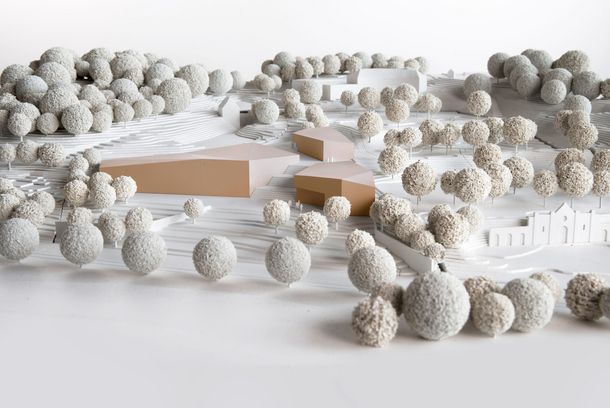

Project Leadership: Prof. Volker Huckemann
Funding Source: Deutsche Bundesstiftung Umwelt [DBU]
Duration: 2019 – 2023
Museums, with their strict conservation requirements, are climatically demanding buildings, often leading to energy-intensive solutions. The Landschaftsverband Westfalen-Lippe (LWL) is planning a new entrance and exhibition building for the Freilichtmuseum Detmold, Germany's largest open-air museum. The project aims for a sustainable, life-cycle cost-oriented design, serving as a model for German architectural culture.
An interdisciplinary consortium, including architects, building climate experts, energy technicians, and educational scientists, will develop an innovative museum concept. The project comprises two phases: firstly, creating a guideline for building materials, technical equipment, and energy concepts, including a monitoring system for the new construction. This phase also focuses on the interplay between conservation requirements and energy needs, emphasizing adaptive components responsive to the museum artifacts' climatic tolerance limits. The findings will be shared with the public, particularly planners and investors.
The second phase will focus on knowledge transfer about sustainable, resource-efficient construction. Considering the diverse visitors to Freilichtmuseum Detmold, the project places a high educational value on museum pedagogy, aiming to reflect these values in the new building's design.
Further Information:


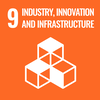

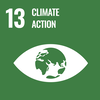
Project management: Prof. Dr. Peter Hense, Prof. Dr.-Ing. Semih Severengiz
Funding source: Ministerium für Wirtschaft, Industrie, Klimaschutz und Energie, Land NRW
Duration: 2023-2024
The EcoTecHub Bergkamen project is creating an innovation and technology center (“hub”) for sustainable value creation in the district of Unna. In future, the EcoTecHub will support companies in shaping sustainable transformation processes against the backdrop of structural change in the former coal-fired power plant region of Bergkamen. The project is primarily concerned with innovations in the field of the circular economy and defossilization, with a thematic focus on energy and materials.
With the creation of the EcoTecHub, the project is making an active contribution to the transformation of the former coal-mining region of the district of Unna into an innovative and future-oriented region. Through close cooperation with the universities in Bochum and Gelsenkirchen, the project creates a lasting transfer of know-how with applied research in the region (the district of Unna itself has no public university or college location). The EcoTecHub combines development, production, recycling and digitalization expertise and in this way offers a unique range of research and development services in the region for research and development in the areas of the circular economy and defossilization.
Among other things, the EcoTecHub deals with the circular perspectives of hydrogen solutions for industry, or researches the optimization of the (chemical) recycling of plastic products and subcomponents.
The EcoTecHub project is preceded by a 14-month preliminary study in the period October 2023 - December 2024. During this period, research teams from Bochum University of Applied Sciences and the Westphalian University of Applied Sciences will investigate the extent to which the EcoTecHub can be anchored in the region with a focus on the circular economy and sustainability so that the city of Bergkamen can qualify for funding under the 5-StandorteProgramm (5-location program). As part of the project, analyses will be carried out to identify the needs, requirements and potential of companies in the region. One aim is to examine location-specific and structurally relevant aspects, incorporating the ideas and visions of the local economy for the development and long-term operation of the technology hub. The researchers are developing supra-regional, long-term and strategic project content that is not yet being addressed by local companies, but shows great (innovation) potential for the region and beyond. Development and implementation scenarios as well as a financing and operator model are being developed to optimize the future viability of the players, products and processes in Bergkamen by establishing a regional technology and knowledge transfer hub.
Project leadership: Dr. Alexandra Lindner
Duration: 12/2023 – 11/2024
Funding organisation: Federal Ministry for Economic Affairs and Climate Protection (BMWK)
The German government's start-up strategy aims to strengthen the start-up scene by empowering female founders and promoting diversity. At 20 per cent, the proportion of female founders in Germany is higher than the national average and has been increasing in recent years. This is partly due to the commitment of start-up networks, which provide a wide range of programmes to raise awareness, promote and network women in the start-up scene.
With the introduction of EXIST-Women, women at universities who are interested in starting a business and have an affinity for entrepreneurship are given the opportunity to familiarise themselves with the topics of start-ups and self-employment at an early stage. The aim is to strengthen the commitment of start-up networks at universities in order to motivate women from different backgrounds to become involved in the topic of start-ups. These include graduates, scientists, students and women with professional qualifications and a connection to the university, such as technical assistants, chemical-technical assistants and administrative assistants.
EXIST-Women includes various funding opportunities:
- Event programmes: Events are organised with the aim of raising women's awareness of the topic of start-ups and familiarising them with relevant resources and networks. Lectures and workshops on topics relating to setting up a business, personal development and networking events are held every fortnight.
- Counselling and support services: Counselling and mentoring services are offered to support aspiring female founders in developing their business ideas and implementing their start-up projects. The university has a budget of 10,000 euros available for the organisation of events and specialised advisory services.
- Financial grants: Prospective female founders receive financial support of up to 2,500 euros as well as material resources worth 2,000 euros to advance their start-up projects and facilitate their first steps into self-employment. There are currently 10 prospective female founders in the funding programme with start-up ideas that vary from very early-stage to shortly before business registration.
More information about the project here.
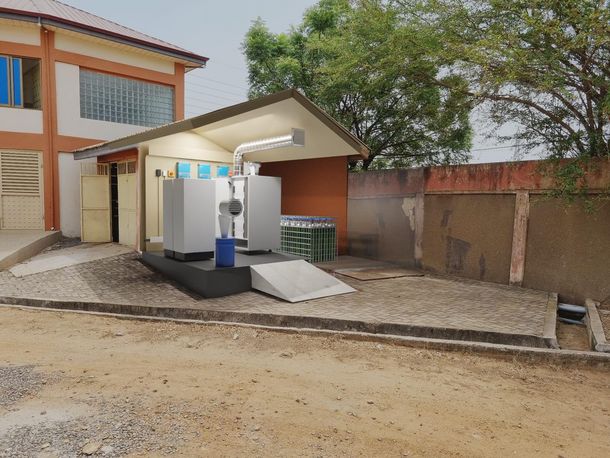
Project management: Prof. Dr.-Ing. Semih Severengiz
Funded by: Federal Ministry for the Environment, Nature Conservation, Nuclear Safety and Consumer Protection (BMUV)
Duration: 01/2023 – 12/2025
Volume (in €): 907.022,01 €
Co-operation partner: Green Power Brains, SFC Energy und Don Bosco Solar
In sub-Saharan Africa, including Ghana, national power grids face challenges that result in unreliable access to electricity. Despite Ghana's development, only 86% of the population will have access to electricity in 2020. In rural areas, the electrification rate is even lower at 28.5%. Climate change impacts such as droughts and low water levels at the Akosombo Dam further strain the electricity supply, which is often replaced by fossil fuels, increasing CO2 emissions.
The GH2GH project addresses these issues by focusing on green hydrogen technology for decentralised energy systems. A pilot project in Tema, Ghana, integrates an electrolyser and storage system into an existing solar mini-grid. This green hydrogen powers a fuel cell during periods of low sunlight, promoting energy self-sufficiency and reducing reliance on diesel generators.
The project will evaluate the lifecycle, social acceptability and sustainability of the system in comparison to batteries. The consortium includes Bochum University of Applied Sciences, Green Power Brains, SFC Energy and Don Bosco Solar. Supported by the German Federal Ministry of Education and Research, the project aims to create a comprehensive network, remove legal and administrative barriers, and export the technology for wider use.
GH2GH
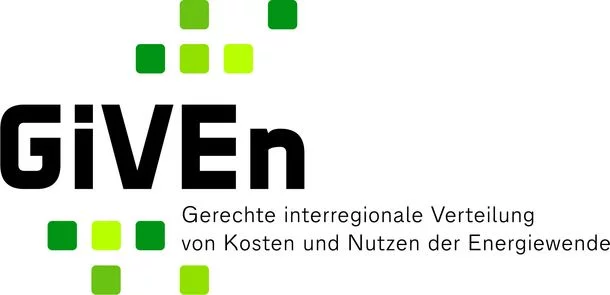
Project management: Prof. Dr. Stephan Sommer
Funding organisation: Federal Ministry of Economics and Climate Protection (BMWK)
Duration: 2022 – 2025
Co-operation partner: UFZ Leipzig
The project addresses the critical issue of ensuring equity in the organisation of energy system transformation. Recognising the importance of equity in selecting locations for renewable energy infrastructure, the project aims to understand how equity between regions can be taken into account in the expansion of such infrastructure. This will involve analysing different equity approaches, assessing their practical implications and exploring regulatory implementation. Through conceptual analysis, empirical application and citizen surveys, the project aims to provide a scientifically sound basis for policy makers to make informed decisions regarding the expansion of energy infrastructure in Germany.
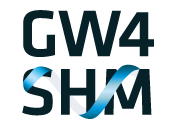
Project management: Prof. Dr.-Ing Inka Mueller
Duration: 01/01/2020 – 21/12/2023
Funded by: Marie Skłodowska-Curie Actions Innovative Training Network
This project focuses on improving the application of guided wave-based structural health monitoring (SHM) for pipelines, particularly in the petrochemical industry and civil infrastructure. Current methods, such as receiver operating characteristic (ROC) curves, are considered to be limited in providing site-specific reliability assessment and information output. The project aims to improve and standardise reliability assessment methods, with an emphasis on quantifying site dependency. Particular attention will be paid to technical hotspots for specific types of damage in pipelines. The project includes a combination of experimental and simulation-based data for specific damage types to achieve informative outputs comparable to established non-destructive testing (NDT) methods. In addition, the project will investigate different signal processing methods to understand their impact on reliability assessment.
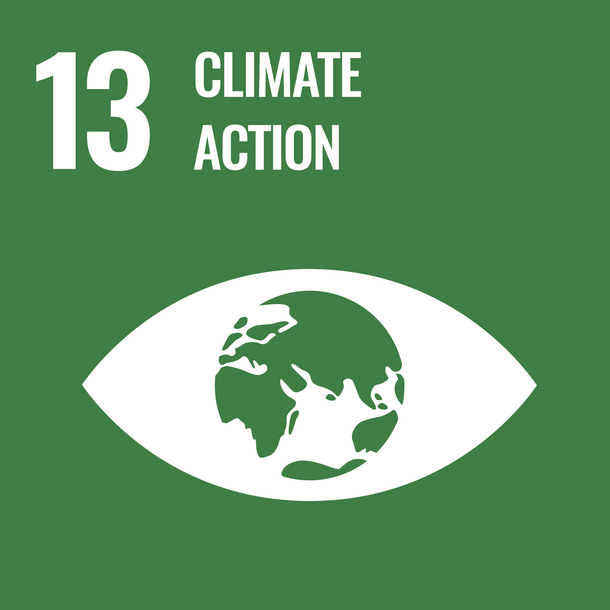
Project leader: Prof. Dr.-Ing. Andrej Albert & Clara Walsemann, M.Sc.
Duration: 2023 – 2025
Funding provider: German Federal Foundation for the Environment (DBU)
The building material (steel) concrete continues to dominate the global and German construction industry. The production of one tonne of the cement required for concrete releases 0.61 tonnes of CO2. Around 2.5 billion tonnes of cement are consumed worldwide in building construction alone. Slabs and foundations in building construction alone account for 55% of this, i.e. around 1.4 billion tonnes of cement and 0.83 billion tonnes of CO2.
One solution for reducing the amount of concrete used in ceilings and foundations is hollow-core slabs, which offer potential material and CO2 savings of around 25 % compared to solid concrete ceilings. However, the disadvantage of previous hollow core systems is the significant reduction in the shear load-bearing capacity compared to solid concrete ceilings, so that the effective area of application is reduced to approx. 60 % of the ceiling or foundation area. As a result, lightweight construction with hollow core slabs has often been at a cost disadvantage compared to solid slabs/foundations. Despite the environmental advantages of hollow core systems, the vast majority of slabs and foundations are therefore still built using solid construction methods.
The central aim of the project is to increase the shear load-bearing capacity of biaxially tensioned hollow core slabs and foundations by 50%, thereby maximising the area of application of hollow core technology and the potential savings in terms of materials and CO2. This goal is to be achieved through a new geometric principle of hollow core technology. These are truncated cone-shaped hollow bodies, which are installed with the "pointed" side alternating upwards and downwards, thus precisely mapping the flow of forces in ceilings/foundations. The increased shear load-bearing capacity of the new hollow core technology means that it can also be used in areas close to walls and columns. This increases the area of application to up to 80 % of the entire floor/foundation area. This approach saves up to 40 % of the concrete used in ceilings and foundations. In addition, for the first time they should also have clear cost advantages over solid ceilings, so that they can be used across the board and achieve a rapid, acute and high environmental impact.
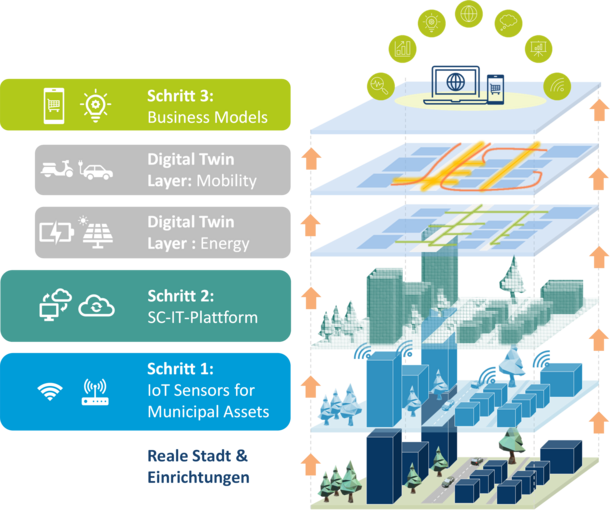

Project Leadership: Prof. Dr. Haydar Mecit
Duration: 07/2022 – 12/2024
Funding Provider: Federal Ministry for Education, Family Affairs, Senior Citizens, Women and Youth (BMBFSFJ), FH-Impuls Programme
The main objective of the project is to advance and implement Smart City use cases in Smart Environment, Smart Mobility & Smart Energy as potentially replicable blueprints.
Building on previous studies, HpSCiLivLabs develops parts of a Smart City research lab as a collaborative space for various Smart City stakeholders. These workshops utilize data-driven simulation, prototyping, and Digital Twins approaches, bringing together participants from different sectors (like science, business, and local government) in an innovative work environment.
The focus is now on finalizing and expanding Smart City real labs (mainly sensors and data from urban spaces) previously set up for testing and validation. A central element is a partially existing and evolving Smart City IT platform, linking data sources from the real labs with the research lab. This platform will facilitate further processing and analysis of data to enhance Smart City use cases in environment, mobility, and energy, using modern visualization and collaboration methods.
Project Consortium:
- Bochum University of Applied Sciences, Institute for Electric Mobility and Laboratory for Sustainability in Technology
- FH Dortmund
- Westphalian University of Applied Sciences Gelsenkirchen, Institute for Internet Security
Industry and Public Institution Participants:
- Stadtwerke Herne AG
- Straßenbahn Herne-Castrop-Rauxel GmbH
- Wirtschaftsförderungsgesellschaft Herne mbH
- City of Herne, Digitalization Office

Project management: Prof. Dr. Stephan Sommer
Funding organisation: Deutsche Bundesstiftung Umwelt (DBU)
Duration: 2023 – 2024
The collaborative research and transfer project "Sustainable IGA 2027", led by Prof. Dr. Stephan Sommer and funded by the Deutsche Bundesstiftung Umwelt (DBU) from 2023 to 2024, brings together the expertise of three universities in the Ruhr area. Bochum University of Applied Sciences, Dortmund University of Applied Sciences and Westphalian University of Applied Sciences aim to develop an integrated sustainability concept for the International Garden Show (IGA) in the Ruhr region in 2027. The project serves as a real-life laboratory for embedding sustainability in the planning, realisation and subsequent use of major events. The integrative concept addresses environmental relief, the garden show as a place of learning for sustainability and the early involvement of various stakeholders, integrating the event into local social structures. The sustainability concept includes six fields of action: Resources & Climate Protection, Recycling & Reuse, Sustainable Mobility, Sustainable Procurement, Education for Sustainable Development and Communication & Participation.

Project Leadership: Prof. Dr.-Ing. Iris Mühlenbruch
Funding: North Rhine-Westphalia State for Connected Mobility and Mobility Management (FöRi-MM)
Duration: 2021 – 2023
The "Stadt Terrassen" project focuses on transforming street spaces into social hubs, play areas for children, and promenades. This initiative, supported by the Zukunftsnetz Mobilität NRW's loan offer of urban furniture, invites cities in North Rhine-Westphalia to temporarily redesign street spaces up to 150 meters, particularly repurposing areas used for car parking. The project aims to enhance the quality of stay and greenery in streets through modular systems. Citizens are encouraged to use the seating and reclining elements, revitalizing streets. Additionally, local participation processes are implemented to engage in dialogue with residents and visitors.
Bochum University of Applied Sciences is responsible for monitoring and evaluating the temporary use of the Stadt Terrassen. Various scientific methods will be used to investigate the following aspects:
- Impact and acceptance: How well is the urban furniture accepted by different user groups? What are the effects of using Stadt Terrassen?
- Formative aspects: Is the urban furniture practical, and what improvements or expansions can be made?
- Process evaluation: Identifying barriers and success factors in implementation, and developing recommendations for future projects.
Further Information:Zukunftsnetz Mobilität NRW website
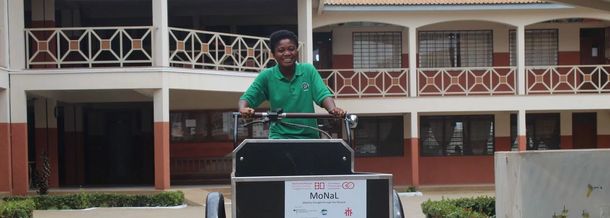

Project Leadership: Prof. Dr.-Ing. Semih Severengiz
Funding Provider: Federal Ministry for the Environment, Nature Conservation and Nuclear Safety (BMUV) (project reference: FKZ 67EXI4011A)
Volume (in €): 397.382
Duration: 08/2020 – 03/2023 (Extended)
MoNaL aims to establish sustainable mobility solutions for Sub-Saharan African countries. The project comprehensively considers the entire lifecycle impact – from vehicle production and design to energy supply and recycling of vehicles and energy infrastructure. A pilot implementation in Ghana, at the site of local partner Don Bosco, involves testing an electric moped and cargo bike rental system. This initiative adapts to local conditions and user requirements. Sustainable mobility is integrated with renewable energy, leading to the development of a smart mini-grid powered by independent solar installations and charging stations.
The mini-grid, part of the project, features automatic billing, enabling real-time adjustments of electricity prices based on factors like supply, demand, weather, and battery levels. The goal is to intensify the use of sustainable mobility alternatives while considering reliable and sustainable energy access. Addressing the issue of e-waste in the target country, the project incorporates the end-of-life phase of the developed product system. It involves analyzing existing recycling structures in Ghana, exploring options for second-life applications of solar modules and batteries, organizing workshops with local stakeholders to develop environmental standards, and conducting training in recycling and upcycling. Qualification measures in e-mobility, solar technology, and recycling ensure the sustainable use of the product.
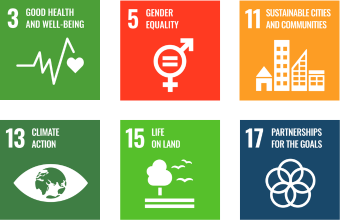
Project management: Prof Dr Petra Schweizer-Ries
Duration: 10/2020 – 09/2024
Co-partner: German Society for Solar Energy (DGS) - Berlin Regional Association (consortium leader)
The MonDoWi module at Bochum University of Applied Sciences focuses on fostering collaboration in the energy sector. Key aspects include:
- Linking Academia and Real World: It connects research teams with tradespeople, businesses, and politicians to support energy transition.
- Encouraging Societal Transformation: The module facilitates discussions and collaborations for major changes in the energy sector.
- Overcoming Communication Barriers: Acknowledging communication challenges, it involves experts to create effective communication spaces, both physical and virtual.
- Global and Practical Focus: Aligning with Sustainable Development Goals, it emphasizes global cooperation and practical applications in energy sustainability.
- Objectives: Its goals are to achieve effective collaboration, develop shared visions, demonstrate successful cooperation, and organize networking events.
Project Leadership: Prof. Dr.-Ing. Friedbert Pautzke
Funding Provider: Federal Ministry for Education, Family Affairs, Senior Citizens, Women and Youth (BMBFSFJ), FH-Impuls programme
Duration: 04/2022 – 03/2024
This project involves designing a modular experimental vehicle and creating Digital Twins to develop a broad range of electric vehicle drive components, aimed at reducing integration efforts.
Project Overview
Objective: To generate a variety of combinable electric vehicle drive components, simplifying integration.
The OMAx-Vehicle project will develop a modular vehicle allowing for the integration and communication of electrical components from various manufacturers. Model-Based Systems Engineering (MBSE) will be utilized for effective, solution-focused implementation, creating digital twins from existing mechatronic systems (OMEx-DriveTrain).
Key Outcomes:
- Modular vehicle design with drivetrain
- Application of MBSE
- Simulation models for digital twins
- Creation of digital twins for drive components
- Incorporation of fuel cell technology into OMEx-DriveTrain
- Hybrid testing and analysis with X-in-the-Loop
- Online educational materials and demonstrations

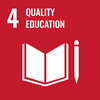

Project management: Prof. Dr.-Ing. Iris Mühlenbruch, Prof. Dr.-Ing. Sebastian Seipel
Funding source: Land NRW
Duration: 2024-2034 (Period of state funding)
The promotion of cycling is a key element of sustainable mobility and therefore an important concern of Bochum University of Applied Sciences. In view of the current shortage of skilled labour, which makes the planning and construction of cycling facilities more difficult, a new professorship for cycling is being established at Bochum University of Applied Sciences. This professorship is being funded by the state of North Rhine-Westphalia in order to support the training of urgently needed specialists and drive forward the transport transition.
The funding covers a period of ten years and provides up to 400,000 euros annually. In addition to funding the professorship itself, the funds also include the employment of two research assistants. These resources will enable Bochum University of Applied Sciences to expand its research and teaching in the field of cycling and at the same time make an important contribution to training new specialists at an academic level.
A key component of the funding is the establishment of a bicycle laboratory. The focus here is on expanding the consortium of survey and measuring equipment to ensure that theory and practice are closely linked in teaching and research. Students and researchers will have the opportunity not only to develop innovative solutions for cycling infrastructure, but also to test them under real-life conditions.
In addition to setting up the bicycle laboratory, Bochum University of Applied Sciences is planning to purchase materials for so-called reallife-laboratories. These reallife-laboratories are of great importance as they make it possible to test theoretically developed concepts in practice and thus strengthen the link to practice. In addition, reallife-laboratories act as an interface between research and the population by creating awareness and acceptance for innovative solutions in the field of cycling infrastructure. This actively involves the population in the development and implementation of new transport concepts.
In addition to the intensive teaching and research work at Bochum University of Applied Sciences, cooperation with neighbouring municipalities, particularly the city of Bochum, is another key aspect of the project. Through this cooperation, practice-orientated solutions are to be developed and implemented directly in the participating municipalities. This networking not only offers students valuable practical experience, but also enables local authorities to benefit from the latest scientific findings and realise innovative cycling solutions locally.
With the establishment of the cycling professorship and the associated measures, Bochum University of Applied Sciences and the state of North Rhine-Westphalia are providing significant impetus for the transport transition and making an important contribution to the training of specialists in the field of cycling. This represents a relevant milestone on the road to sustainable mobility and a future-proof transport infrastructure.
Further links:
Project management: Wuppertal Institute
Sponsor: Ministry of Economic Affairs, Innovation, Digitalisation and Energy of the State of North Rhine-Westphalia
Consortium: University of Wuppertal, Bochum University of Applied Sciences, Ruhr University Bochum, RWTH Aachen, Wuppertal Institute
Duration: 07/2021 – 12/2023.
The Protanz.NRW project analyses the impact of energy and climate protest movements on the social acceptance of innovative technologies for industrial decarbonisation in North Rhine-Westphalia. Cooperation between civil society, industry and politics is crucial to achieve climate neutrality by 2045. The project investigates factors influencing the acceptance of CO2 reduction projects in the industrial sector and aims to understand public attitudes using various scientific methods. Project activities include a kick-off event, essays on media narratives and support for the energy transition. The consortium includes several universities.
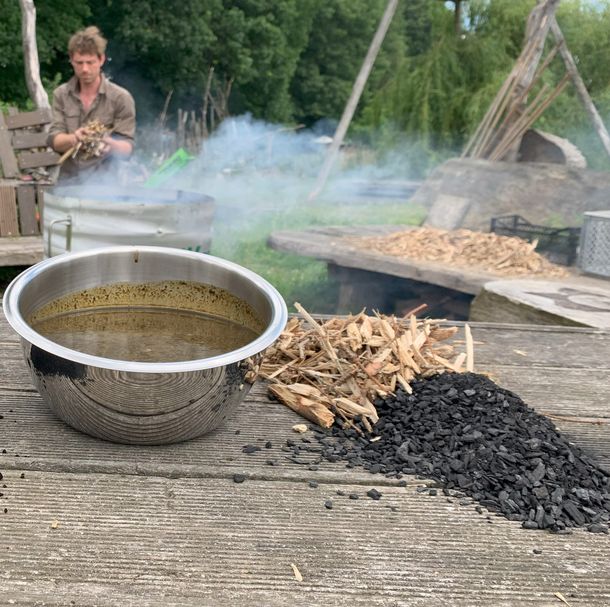
Project management: Prof. Dr. Marcus Schröter
Bochum University of Applied Sciences is addressing greenhouse gas emissions in the Ruhr region through its Sustainability in Engineering and Sustainable Development departments. Using innovative pyrolysis technology, the project aims to sequester greenhouse gases in biochar. The biochar can be used to improve soil fertility or as a sustainable substitute in concrete production. The project includes the construction of pyrolysis furnaces, tests on the impact of biochar on soil, and workshops to inform local businesses about carbon offsetting and help them find relevant service providers.
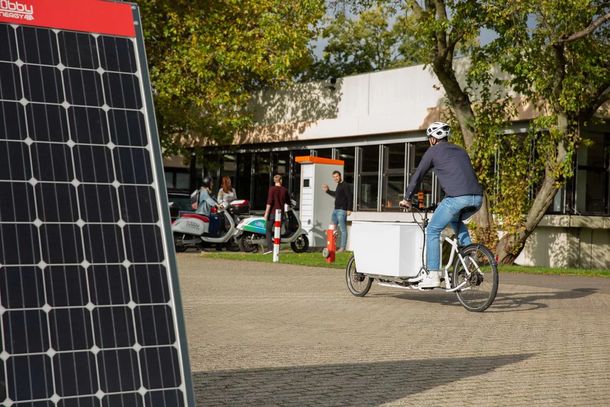

Project Leadership: Prof. Dr.-Ing. Semih Severengiz
Funding Provider: Federal Ministry for Education, Family Affairs, Senior Citizens, Women and Youth (BMBFSFJ)
Duration: 07/2022 – 06/2024
The transportation sector is undergoing a major transformation, focusing on reducing greenhouse gas emissions and air pollutants, and developing digital, smart solutions for resource and land efficiency in urban areas. Solutions must be sustainable and affordable. Light Electric Vehicles (LEVs) like e-scooters, pedelecs, cargo bikes, and e-mopeds are key to achieving energy-saving, emission-free urban mobility.
The project explores sustainable energy supply for LEVs, addressing the challenge of integrating these vehicles with renewable energy sources using digital solutions. It builds on the SCiSusMob I subproject, emphasizing a holistic approach to mobility and energy from a sustainability perspective, incorporating future-proof digital infrastructure. The aim is to test and validate research findings in a real-world laboratory, focusing on a unified platform for mobility and energy services. This leads to a standardized methodology for evaluating the sustainability impact of mobility services.
Key research areas include:
- Developing sustainability assessment methods like Life Cycle Assessment (LCA) and acceptance studies.
- Investigating energy supply concepts for LEVs.
- Creating business and operating models for mobility and energy services.
- Designing a decentralized digital platform for these services.
- Trialing the mobility and energy system in a real-world setting.
- Establishing standards and legal frameworks.
Led by Prof. Dr.-Ing. Semih Severengiz, the project is a collaborative effort with companies in the energy and mobility sectors, supported by firms like e-bility GmbH, Stadtwerke Bochum Holding GmbH, and others providing third-party funds.

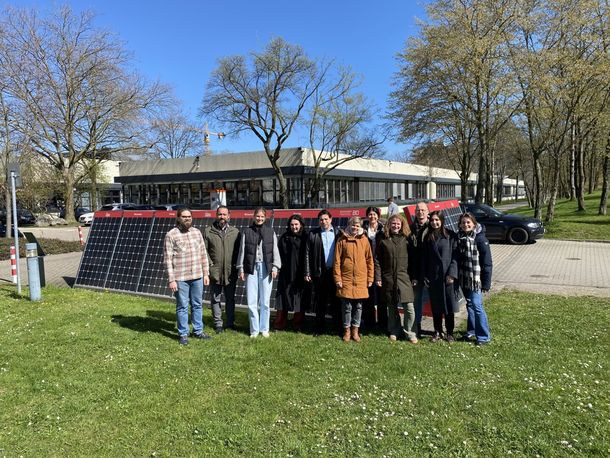

Project Leadership: Prof. Dr.-Ing. Semih Severengiz
Funding Provider: EU Commission
Duration: 06/2022 – 05/2026
Innovative Vocational Education in the Energy Transition Era SEED (Sustainable Energy Education) is a collaboration between five European regions, led by the Utrecht University of Applied Sciences, aiming to create a fossil-free continent through excellent, innovative vocational training.
SEED advocates for education's critical role in fighting climate change and transitioning to green energy. The project fosters collaborative development of superior energy education among vocational institutions and regional players, with goals to increase qualified professionals, integrate study programmes with job markets, and advance new energy technologies.
The initiative establishes five Centres of Vocational Excellence across the Netherlands, Finland, Spain, Germany, and Greece, forming an international community sharing standards and insights in sustainable energy education.
Additionally, SEED, part of the CoVE programme funded by the EU's Erasmus+, equips individuals with future-oriented skills and bolsters regional innovation. It supports best practices in teaching, industry partnerships, and educational management to enhance vocational education's appeal.
CoVEs, introduced by the European Commission, are networks that update vocational practices and offer quality skills training, linked to regional development strategies to foster new synergies and knowledge creation.
Project Leadership: Prof. Dr. Haydar Mecit
Funding Provider: Federal Ministry for Economic Affairs and Climate Action (BMWi)
Duration: 2020 – 2023
SEGuRo drives the development and testing of novel, digital energy solutions in urban spaces, focusing on the safe digitalisation of a section of the electricity grid in Herne's real environment. This transformation into a Smart Grid involves stakeholders from business, science, and the public sector, emphasizing secure, critical energy infrastructures.
With increasing integration of distributed generators (like photovoltaic systems) and loads (like electric cars and heat pumps), the project addresses the dynamic and unpredictable network behaviour in distribution grids. It innovates in distribution network monitoring, enabling a holistic system understanding, and develops a SEGuRo concept comprising tamper-proof data signing at measurement points, secure data transmission, and a real-time monitoring platform. This platform combines a digital twin, dynamic network state estimation, data management, and visualisation - a comprehensive innovation in network monitoring.
The project's objective is to create a digital twin based on detailed system modelling, supporting real-time network operation and compatible testing of new regulatory strategies or components before field integration. Bochum University of Applied Sciences, with its long-term partner Stadtwerke Herne AG and the SEGuRo research consortium, focuses on IoT & ICT possibilities in Herne's network area. The university's main tasks include scenario and requirements definition for secure, smart grids, and collaborating on a real-time platform for network monitoring and control in Herne. The project also emphasises Smart Grid field tests and research on monetising Smart Grid-based network services, aiming to explore future monetary potentials of technically feasible Secure Smart Grids in the context of Smart Energy.
The Real Lab Herne, led by Bochum University of Applied Sciences, will serve as a prototype and blueprint for other regions in Germany and internationally, supporting and helping to implement the energy transition elsewhere.
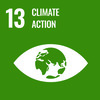
External content
YouTube Video
We need your consent to show you a video from YouTube here. You can display this (and therefore all other YouTube content on our website) after you have given your consent.
With your consent, personal data may be transferred to third-party platforms. You can find out more in our privacy policy . You can opt out at any time via the Cookie settings link at the bottom of the page.
External content
YouTube Video
We need your consent to show you a video from YouTube here. You can display this (and therefore all other YouTube content on our website) after you have given your consent.
With your consent, personal data may be transferred to third-party platforms. You can find out more in our privacy policy . You can opt out at any time via the Cookie settings link at the bottom of the page.
Project management: Prof. Dr. Christian Scheffer
Duration: 2024 – 2027
Funding body: DFG (German Research Foundation)
Project Partners: TU Braunschweig
Collaboration partners: NASA Ames (USA), MIT (USA), University of Houston (USA), Stony Brook University (USA)
The project explores the construction and modification of structures composed of many basic elements using autonomous robots. It addresses challenges in scenarios with very large or very small dimensions, particularly in extraterrestrial space or microscopic environments. Recent advances in transformable matter and scalable lattice materials enable the construction of modular, reconfigurable lattice-based structures. The project focuses on the next step - empowering a collective of robots to perform construction tasks based on cellular structures, such as construction, maintenance and reconfiguration. The scalability relies on parallelism between simple robots, combining distributed coordination algorithms with optimisation methods that take into account various geometric aspects. The collaboration includes TU Braunschweig and partners such as NASA Ames, MIT, University of Houston and Stony Brook University.
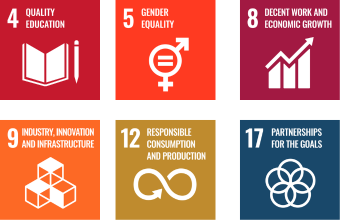
Projecr leadership: Prof. Dr.-Ing. Friedbert Pautzke, Prof. Dr. Roland Böttcher & Dr.-Ing. Alexandra Lindner
Funding provider: Federal Ministry for Education, Family Affairs, Senior Citizens, Women and Youth (BMBFSFJ)
Duration: 2023 – 2027
The StartUpLabs@BO project began at Bochum University of Applied Sciences in early 2023 and is supported by the Federal Ministry of Research and Education as part of the "Research at Universities of Applied Sciences" programme. It will run for four years and focuses on improving start-up activities at the university. The StartUpLab is intended to be the first point of contact and an open meeting place for those interested in founding a company and to offer creative players special freedom to experiment, validate and test innovative ideas. The appropriate equipment will be provided and students, staff and lecturers will be supported.
The four main objectives of the project are
- Increasing transfer and start-up skills at Bochum University of Applied Sciences.
- Establishing and networking decentralised labs and a central StartUpLab.
- Increasing diversity in start-ups.
- Development of programmes for alumnae* and alumni*.
Further information can be found on the project website.


Project management: Prof Dr Mi-Yong Becker
One principle on the way to a sustainable society is that transformation is a joint task. Bochum University of Applied Sciences is putting this idea into practice with the THALES project, which was launched in 2023. It takes university knowledge out of the ivory tower and brings sustainability research results to life in the Ruhr metropolis. The aim is for technical, economic and social innovations to arrive and be implemented where they were originally developed: At the heart of our society.

Project management: Prof. Dr.-Ing. Christoph Mudersbach in cooperation with Prof. Dr Jörg Frochte
Billions of euros in property damage, almost 200 deaths: the flood of the century in July 2021 showed that the Ruhr metropolis is not adequately prepared for extreme weather events caused by climate change. Artificial intelligence can help make cities more resilient. The project will create a digital and intelligent monitoring system for flooded streets. Where in the Ruhr metropolis is it most dangerous to flood? Analysis of weather data and forecasting models will provide clues. The Hydraulic Engineering and Hydromechanics Research Department is working with experts in applied artificial intelligence on this central question: How can urban development take account of floods, heavy rainfall and the like? Solutions are developed and implemented together with, for example, water boards, local authorities, municipal utilities and administrations.

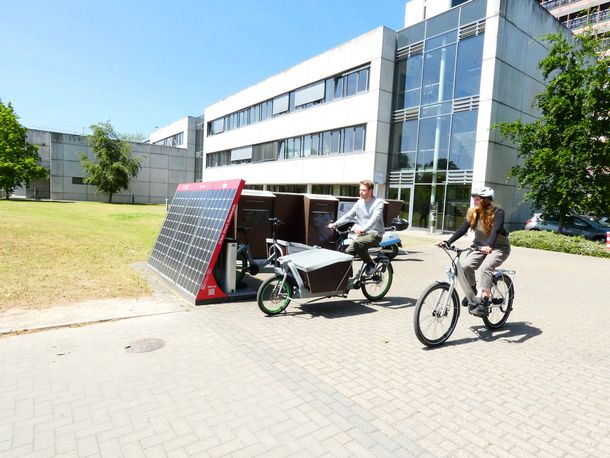
Project leader: Prof. Dr.-Ing. Semih Severengiz
E-scooters, e-bikes and the like now characterise the streetscape of many large cities in NRW. However, the use of these vehicles is not yet attractive for all citizens. E-micromobility could make a contribution to climate protection if business models work sustainably and economically. What are the problems? How can it become more widespread, especially in urban peripheral areas, and what increases acceptance? Methods such as spatial analyses, surveys of citizens and real-world laboratories should provide answers. In collaboration with an e-vehicle manufacturer and companies for battery exchange and solar charging stations, new business models are being trialled and evaluated with the help of real usage data. The project is based in the Laboratory for Sustainability in Technology.
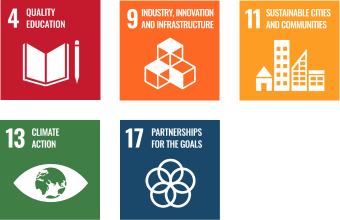
Project management: Prof. Dr Petra Schweizer-Ries
Funding programme: Innovative University
Funding organisation: Federal Ministry of Education and Research (BMBF)
Duration: 01/2023 – 12/2027
This project is about urban ecology and community building. The project is based on our university garden, the BOase. The BOase is unique in that it is based on the concept of permaculture. The BOase addresses biodiversity and sociodiversity on campus in a creative and innovative way. The aim of our transfer project 4 is to extend the concept and approaches of the "BOase" for the formation and promotion of communities to the entire Ruhr metropolis. To this end, we are addressing all types of green spaces as important socio-ecological areas in urban spaces. Our research focuses on the exploration and further development of awareness-based methods, which we consider to be key factors for successful communities and which we apply in a process-oriented manner for the participatory development of green spaces.
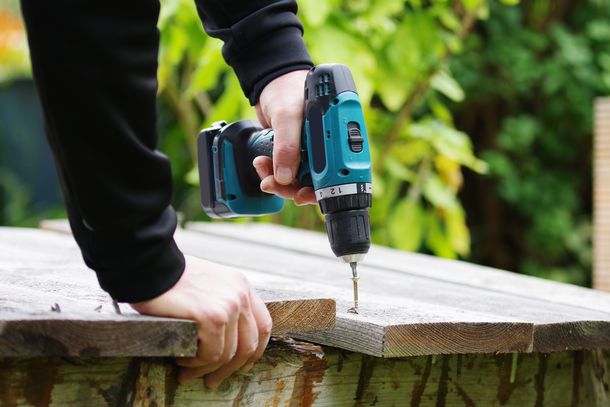
Project management: Prof. Dr Oliver Stengel & Prof. Dr Jacinta Kellermann
Bochum University of Applied Sciences, known for its repair initiatives such as the Repair Café and the Library of Things, is looking to expand its impact. The Faculties of Electrical Engineering and Computer Science plan to digitally and locally network lending and repair stations across the Ruhr metropolis, promoting sustainability and waste reduction through shared resources and workshops.
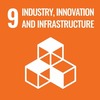
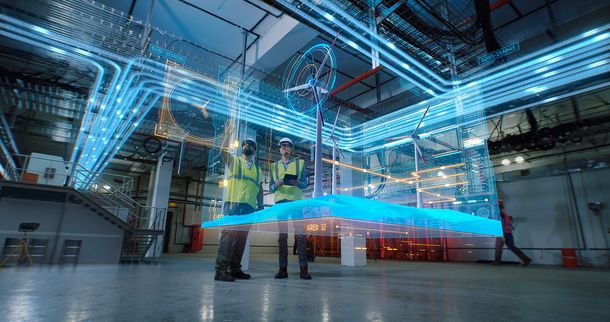
Project management: Prof. Dr. Daniel Schilberg
The fourth industrial revolution is already in full swing: people, machines and processes in industry are directly networked. Can the Ruhr metropolis keep up? After all, standard products can now be produced cheaply and in high quality overseas. The key is sustainable and efficient production. Bochum University of Applied Sciences is advising and supporting regional companies in the digitalisation and networking of their production processes. In the BO Smart Factory, real processes are recorded and possible scenarios are analysed. Answers are also being developed to the question: "How do you prepare employees for change?

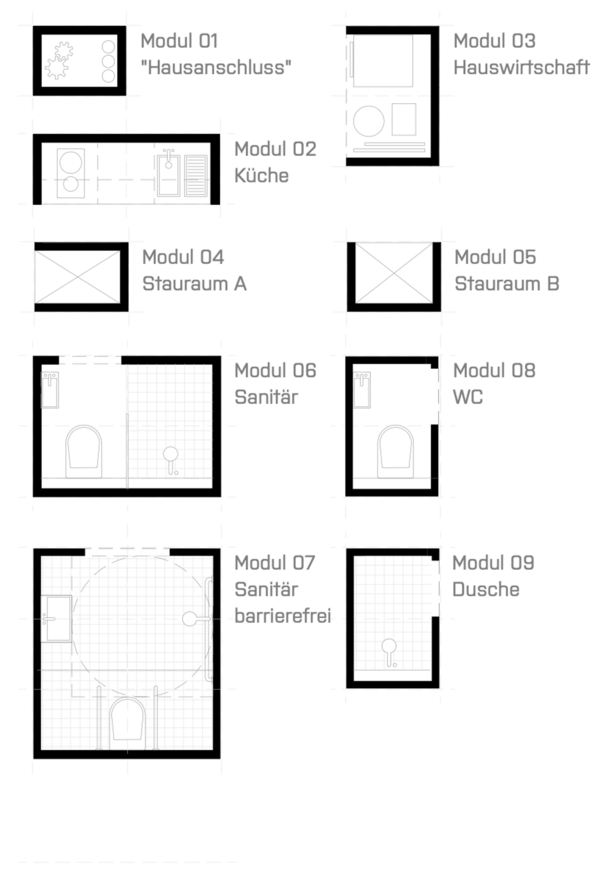
Project Lead: Prof. Dr. Klaus Legner
Funding Source: Federal Ministry for Education, Family Affairs, Senior Citizens, Women and Youth (BMBFSFJ)
Anyone dreaming of home ownership often imagines a house or flat in the middle of nature, away from the city. This can be problematic, since urban sprawl means that cities continue to expand, (green) spaces are taken up and more traffic is generated, for example. It makes more sense to use existing areas in neighbourhoods and create good housing solutions. The "HABI-CORE" infrastructure core is designed for integration into vacant existing buildings and for small, unused gaps between buildings in the city. The aim is to create additional low-cost, affordable and accessible living space in urban areas. As part of the project, a sustainable prototype made of wood will be developed, built and tested and presented as a walk-in prototype in Bochum.

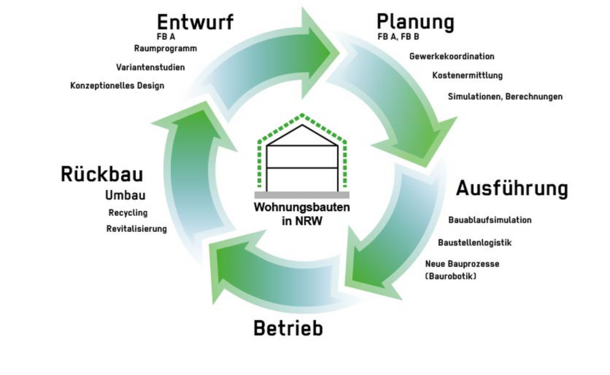
Project leader: Prof. Dr. Sven Pfeiffer
The aspect of sustainability is becoming increasingly important in the refurbishment and planning of buildings. Questions such as: Which form of insulation or heating is more sensible, more social, more economical? To find answers more efficiently in architectural planning, the Department of Architecture is working on a digital planning method that models building data in advance.

Project management: Prof. Dr.-Ing. Friedbert Pautzke und Tobias Scholz, M.Sc.
Funding source:Federal Ministry for Education, Family Affairs, Senior Citizens, Women and Youth (BMBFSFJ)
Project executing organization: Bundesinstitut für Berufsbildung (bibb)
Funding programm: InnoVET
Duration: 2024 - 2027
Challenge
The need for skilled workers in trades and industry who are familiar with battery technologies, electromobility and hydrogen systems is constantly increasing. To successfully shape the energy and mobility transition, these skilled workers must continue their training in order to be able to develop and implement innovative technologies.
Solution
The task of the TraFuSMS project is to develop a modular educational concept that enables the needs-based training and further education of specialists for the energy and mobility transition. The focus is on three modules for specialists from automotive companies and industry as well as employees of start-ups and smaller companies in the field of sustainable mobility:
- Assessment of batteries in electric vehicles: This module enables learners and companies to carry out diagnostic and repair measures on electric vehicles and their energy storage systems.
- Innovation management in small companies: This promotes the entrepreneurial and innovation-oriented behavior of employees within the company.
- Working on hydrogen systems and developing sustainable energy systems: Learners are prepared to work safely on hydrogen systems and receive the knowledge to evaluate different energy systems and mobility solutions in terms of their sustainability.
The modular structure of the qualification also enables employees in start-ups or smaller companies to participate without having to be away from the company for long periods of time.
In addition, the use of intelligent, AI-based translation software is being tested to expand the content with English-language technical terms and thus prepare learners for documentation in English.
Transfer
The learning offer is to be certified by the Dortmund Chamber of Crafts (HWK) and the Bochum Moter Vehicle Trade Guild (KFZI) as well as the regional Chamber of Industry and Commerce (IHK) after successful testing. This certification strengthens the sustainability and recognition of the concepts in the industry.
After the project ends, the learning content developed will be included as educational offerings or to supplement training at the Chamber of Crafts and the Guild for the Automotive Trade. In addition, the technical teaching modules offer direct links to the energy industry, as energy storage devices from motor vehicles are reused as decentralized grid storage devices in households and industry.
Consortium
- Hochschule Bochum
- Electric Vehicle Institute
- DigiTeach Institute
- Resort studies, teaching and further training
- Dortmund Chamber of Crafts
- Bochum Moter Vehicle Trade Guild
Assoziiert
- Chamber of Industry and Commerce
- Bochum Economic Development
Further: Voltvogel, E-Adventures, ruhrvalley, Nüwiel

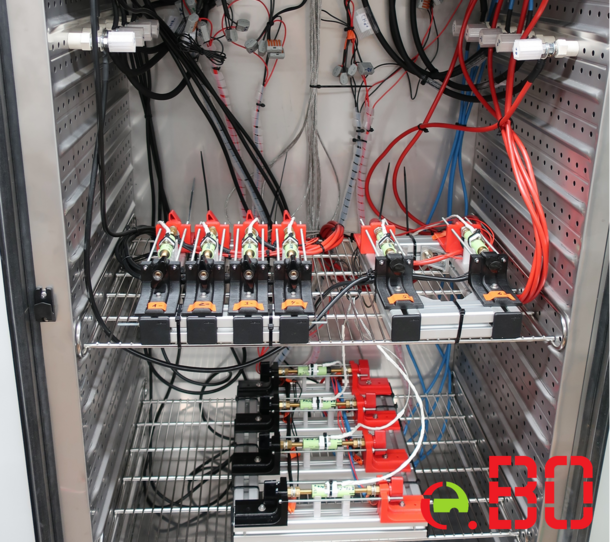
Project Leadership: Prof. Dr.-Ing. Friedbert Pautzke
Funding Provider: Federal Ministry for Education, Family Affairs, Senior Citizens, Women and Youth (BMBFSFJ), "Battery 2020 Transfer" initiative
Duration: 11/2022 – 11/2025
Co-op partners: Neue Effizienz gGmbH (an institute of the University of Wuppertal) and the Chair of Electric Mobility and Energy Storage Systems at the University of Wuppertal
UniZuB focuses on developing, testing, and optimizing software and hardware solutions for assessing the health (State of Health; SOH) of high-voltage batteries (HV batteries), combining computer simulations and practical experiments for field application.
The state estimator, also referred to as a diagnostic tool or battery tester, will be developed over three years in collaboration with industry and research partners, using the transdisciplinary Design Thinking method. Key industry participants include AVL DiTEST GmbH, specializing in HV system measurement equipment, and Zweidenker GmbH, experts in cloud solutions. The project also involves AWG Abfallwirtschaftsgesellschaft mbH Wuppertal, interested in the tool for decisions regarding "Second-Life vs. Recycling" for HV batteries.
The project aims to:
- Develop a fast, reliable, adaptable methodology for estimating the state of HV batteries.
- Create a demonstrator for a universal rapid diagnostic device for HV batteries, including feasibility proof.
- Develop cloud solutions for storing various types of data.
- Realize a sustainable value chain for HV batteries (Circular Economy).
- Facilitate knowledge and technology transfer for lifecycle assessments of HV batteries.
- Establish a uniform methodology for hazard assessment in transporting electric vehicles and battery recycling.

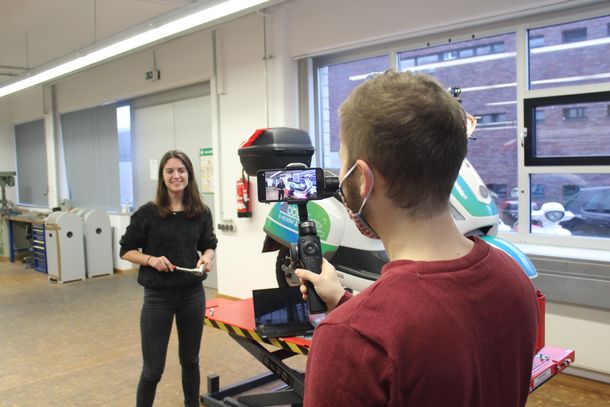
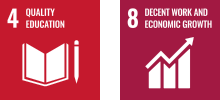
Project Leadership: Prof. Dr.-Ing. Semih Severengiz
Funding Provider: Federal Ministry for Education, Family Affairs, Senior Citizens, Women and Youth (BMBFSFJ)
Duration: 12/2020 – 11/2024
The InnoVET project "UpTrain" focuses on revitalising vocational education in the mobility industry's commercial-technical sector. Addressing the need for 100,000 additional qualified staff in public transport by 2025, the project responds to challenges in digitalisation, electrification, and automation.
"UpTrain" aims to improve the permeability and attractiveness of industry-specific education through digital learning materials for a Mobility Academy and tripartite advanced training programmes linking transport companies, universities, and industry. The project will develop and test comprehensive further education models for the public transport sector.
Bochum University of Applied Sciences’ Laboratory for Sustainability in Technology will enhance cooperative learning sequences in energy, new mobility solutions, and scenario techniques, integrating digital content with blended learning approaches. The university also contributes to cross-institutional educational advisory services and participates in project evaluation and dissemination.
Partners include:
- VDV Academy e.V. (Association of German Transport Companies Academy e.V.)
- Cologne Transport Authority AG
- Rheinbahn AG
- Bergische Universität Wuppertal
- Bochum University of Applied Sciences
- Stadtwerke Verkehrsgesellschaft Frankfurt am Main mbH
- Rhein-Neckar-Verkehr GmbH
- Frankfurt University of Applied Sciences
- Hochschule Darmstadt – University of Applied Sciences
The project is funded by the Federal Ministry of Education and Research (BMBF) under the InnoVET initiative, executed by the Federal Institute for Vocational Education and Training (BIBB).


